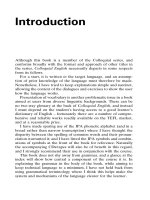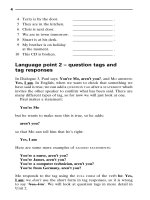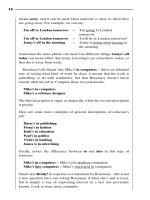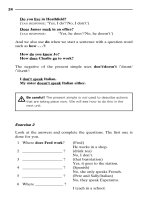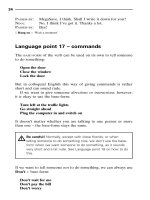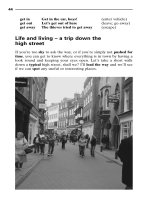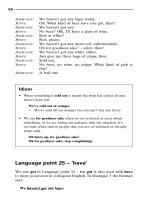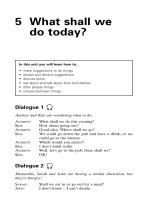Tài liệu A complete English language course part 25 docx
Bạn đang xem bản rút gọn của tài liệu. Xem và tải ngay bản đầy đủ của tài liệu tại đây (280.38 KB, 10 trang )
Notice what happens in questions:
Do you always leave the TV on?
Have you often visited Italy?
– the adverb comes after the
SUBJECT
.
Exercise 8
Decide which of these sentences have the adverb in the wrong
position, and correct them. Some of the sentences are okay.
1 Simon reads often in the evenings.
2 You probably’ll miss the bus.
3 Does Gerry usually drive to work?
4 They’ll definitely want to come with us.
5 Suzie likes a lot Indian food.
6 Is often the weather wet in this part of the country?
7 Barry doesn’t like at all Indian food.
8 We every Saturday go to watch a football match.
9 Every evening I have a bath.
10 I have a bath every evening.
Exercise 9
Turn these statements into questions – watch out for the adverbs.
1 Henry’s often in the local library.
2 James is always working in the Internet café.
3 Tom’s brother and his wife have often visited France.
4 You usually go to the restaurant next door.
5 He often has to go abroad.
6 George goes to the pub every Friday evening.
Phrasal verbs
drive (around) – ‘drive to lots of different places’; we can drive around, or
we can drive people around. Let me drive you around means ‘Let me
take you to different places in the car and tell you about them’.
show (a)round – ‘show someone lots of different places’; Will you show us
round? means ‘Will you take us to different places and tell us about
them?’. You can show someone round a town or city, or you can show
them round your house! When people come to look at your house to
see if they want to buy it, we say Let me show you round.
1111
2
3
4
5
6
7
8
9
10
11
1211
13
14
15
16
17
18
19
20
21
22
23
24
25
26
27
28
29
30
31
32
33
34
35
36
37
38
39
40
41
4211
223
Life and living – people and population
There’s a lot of talk about people in this unit, and in the United
Kingdom there’s certainly no shortage of people. Nearly sixty
million people live in the four constituent countries of the UK – by
far the majority (48 million) live in England, with 6 million living
in Scotland, 3 million in Wales and 2 million in Northern Ireland.
Also part of the British Isles, but not part of the UK, is the Republic
of Ireland with over 3.5 million people.
Britain is famous for the multicultural nature of its population.
Particularly in the cities – not just London but other cities such as
Birmingham (Britain’s second city), Bristol and Brighton (where
Helen and Justine in Dialogue 2 come from) – you’ll meet people
from all parts of the world. Just walk down the street and you’ll
encounter British citizens whose family links go back to Africa,
India, China and just about anywhere else in the world you can
think of. Many of these people speak languages in addition to
English – for example, in London there are over 200 languages
spoken among the 8 million inhabitants of the city! If you want to
broaden your experience of this side of things, you can buy books
in the same series as this one to help you learn: Chinese, Cantonese,
224
Hindi, Urdu, Panjabi, Gujarati, Somali, for example, as well as two
language which, like English, are indigenous to the UK: Welsh and
Scottish Gaelic.
This cultural and linguistic diversity is what many people think
makes Britain a very special place to live and work, and of course
a great country to visit!
Glossary
shortage – not many (so no shortage means ‘a lot’)
constituent countries – the countries that together form the UK
majority – most, the greatest number
multicultural – having people from many cultural backgrounds
encounter – meet
links – connections
just about – almost, very nearly
inhabitants – people who live in a place
broaden – widen, make more broad
as well as – and also
indigenous – something or someone that arose or was born in a place
rather than being imported or coming from somewhere else
diversity – variety, having many different aspects
great – wonderful, very good
1111
2
3
4
5
6
7
8
9
10
11
1211
13
14
15
16
17
18
19
20
21
22
23
24
25
26
27
28
29
30
31
32
33
34
35
36
37
38
39
40
41
4211
225
14 What would
you do?
In this unit you will learn how to:
• talk about things that haven’t happened
• talk about what might happen
• discuss possibilities
• identify and use the two main types of conditional in English
Dialogue 1
Justine and Ann are in town. Suddenly Justine sees a newsagent’s and
remembers something she has to do.
J
USTINE
: Hang on a minute, Ann! I need to go into the
newsagent’s.
A
NN
: What for? We’ve already got a newspaper.
J
USTINE
: I need to buy a lottery ticket.
A
NN
: A lottery ticket? I’m surprised at you, Justine – really
I am! What a waste of money!
J
USTINE
: What do you mean, a waste of money? If I play, I
might win!
A
NN
: Like hell! But anyway, even if you did win, what
would you do with the money?
J
USTINE
: If I won I’d do lots of things – I’d go on a trip round
the world, for a start. And I’d buy my Mum and Dad
a new house. And I’d give money to charity. And . . .
A
NN
: I bet you wouldn’t be happy, though.
J
USTINE
:[snorts] I bet I would! If you won the lottery, you’d
be happy, wouldn’t you?
A
NN
: I wouldn’t play in the first place, so it wouldn’t
happen, would it?
J
USTINE
: But if you did. You’d find plenty of things to spend
the money on, wouldn’t you?
A
NN
: Well, yes . . . I suppose I would. But . . .
J
USTINE
: Well there you are then! Wait here while I go in and
buy a ticket.
A
NN
: You’ll be wasting your money.
J
USTINE
: You won’t say that if I win.
[Justine goes in, but Ann calls after her]
A
NN
: Justine!
J
USTINE
: Yes, what is it now?
A
NN
: Get me a ticket as well, would you?
Language point 79 – conditionals
C
ONDITIONALS
are forms of the verb that describe actions or events
that have not happened, but could happen – things that are possible.
Conditional sentences have two parts: a
MAIN CLAUSE
and an
IF
-
CLAUSE
. There are two main types of conditional in English – C1
and C2 – and we are going to look at both of them in this unit. So
– let’s look at the following similar, but different, sentences:
[C1] If I have
time, I’ll help you with the washing-up
[C2] If I had
time, I’d help you with the washing-up
You can see that these sentences are the same except for the verbs.
Now let’s look at the meanings:
• in the C1 sentence, I am saying that it is possible that I’ll have
time to help, but that I don’t know for sure – so it’s possible
that I’ll be helping with the washing-up;
• in the C2 sentence I am saying that I haven’t got the time, so I
won’t be helping with the washing-up at all.
You can see the difference in Dialogue 1, where Justine uses both
C1 and C2 conditionals – she says if I win
(C1) because she thinks
it’s a possibility, but when talking about Ann she says if you won
(C2) because Ann doesn’t do the lottery and so it won’t happen and
is therefore unreal.
We’ll look at C2 conditionals later in this unit, but first we’ll
concentrate on C1.
1111
2
3
4
5
6
7
8
9
10
11
1211
13
14
15
16
17
18
19
20
21
22
23
24
25
26
27
28
29
30
31
32
33
34
35
36
37
38
39
40
41
4211
227

